Report from the 80th General Convention
The 80th General Convention of the Episcopal Church met in Baltimore July 8-11. The typically once-every-three-years meeting was postponed a year because of COVID-19 and shortened from eight days to elect persons for office, approve a budget, and to attend to other essential matters. Yet, the convention still considered 436 resolutions.
Online meetings permitted the legislative committees to make decisions prior to arriving for the in person portion of the meeting. The House of Deputies and the House of Bishops then met in person solely for floor debates, rather than any committee work. Most of the resolutions were approved in larger batches placed on the consent calendars to allow time for debate only on more controversial measures or on actions that they wanted to raise to greater prominence.
Reflections from the Deputation
First Time Deputy
Submitted by Cissy Bowden
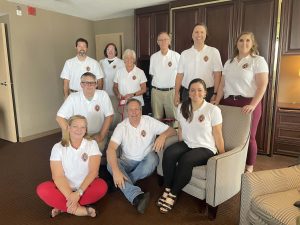 Having attended four prior General Conventions in the past (twice as an ECW Triennial Delegate and twice as a Deputy’s spouse), I felt somewhat prepared to serve as a first time Deputy for GC80. I was quite overwhelmed, however, with the rapid pace of voting on legislation on the house floor, with over 400 resolutions to be considered in only four days (and nights!). Just the time involved in searching the Virtual Binder to review the resolutions, the explanation of the resolutions, the floor amendments, the calendars, the agendas, the committee reports, and listening to the debates both for and against the resolutions, then being prepared to vote, was enough to make this first time Deputy’s head spin! Whew! It looked so much easier from the observer’s point of view! And then there were reports, memorials, elections, worship, and late evening deputation meetings, not to mention the daily Covid testing and wearing masks. But it was truly a privilege and a blessing to have the opportunity to do this work on behalf of our Diocese, and I am so very grateful for the support and assistance I received from my fellow deputies and from our Bishop, and for the opportunity to share this experience with them.
Having attended four prior General Conventions in the past (twice as an ECW Triennial Delegate and twice as a Deputy’s spouse), I felt somewhat prepared to serve as a first time Deputy for GC80. I was quite overwhelmed, however, with the rapid pace of voting on legislation on the house floor, with over 400 resolutions to be considered in only four days (and nights!). Just the time involved in searching the Virtual Binder to review the resolutions, the explanation of the resolutions, the floor amendments, the calendars, the agendas, the committee reports, and listening to the debates both for and against the resolutions, then being prepared to vote, was enough to make this first time Deputy’s head spin! Whew! It looked so much easier from the observer’s point of view! And then there were reports, memorials, elections, worship, and late evening deputation meetings, not to mention the daily Covid testing and wearing masks. But it was truly a privilege and a blessing to have the opportunity to do this work on behalf of our Diocese, and I am so very grateful for the support and assistance I received from my fellow deputies and from our Bishop, and for the opportunity to share this experience with them.
Pictured: The Diocese of Georgia deputation
Technology at General Convention
Submitted by the Rev. Ted Clarkson
 It was the best of times. It was the worst of times. It was technology at General Convention. The 80th General Convention was the shortest in generations due pandemic concerns, only four days rather than the usual eight to ten days. How was this possible? The answer was technology. In particular, the committees of General Convention, which have previously only met in-person at convention, accomplished their tasks via zoom meetings in the three months leading up to the in-person meeting in Baltimore. Committee work is essential to the functioning of General Convention and thus the Church. Without technology, ie. the availability of zoom, it is possible that General Convention would have had to have been postponed another year. Technology, however, was not all good. General Convention has gone paperless with every deputy being assigned an iPad for access to the resolutions under consideration and for voting. Great idea, but an iPad is useless without reliable WIFI, and reliable WIFI was in short supply. A meaningful portion of those precious four days was squandered due to this problem. For all of its good and bad, technology is here to stay at General Convention. One of the resolutions passed was a change to the rules of the House of Deputies that will allow the use of zoom meetings in future conventions, not just in the extraordinary circumstances of this pandemic shortened meeting. This will allow more people to give input into the workings of the church—people can participate in committee without having to travel to convention for committee hearings—but we may lose the substantial benefit of people meeting face-to-face with all of the interactions that provides. Having been a deputy at four General Conventions. Technology, for good or for ill, will be playing an ever expanding role in the governance of the Episcopal Church.
It was the best of times. It was the worst of times. It was technology at General Convention. The 80th General Convention was the shortest in generations due pandemic concerns, only four days rather than the usual eight to ten days. How was this possible? The answer was technology. In particular, the committees of General Convention, which have previously only met in-person at convention, accomplished their tasks via zoom meetings in the three months leading up to the in-person meeting in Baltimore. Committee work is essential to the functioning of General Convention and thus the Church. Without technology, ie. the availability of zoom, it is possible that General Convention would have had to have been postponed another year. Technology, however, was not all good. General Convention has gone paperless with every deputy being assigned an iPad for access to the resolutions under consideration and for voting. Great idea, but an iPad is useless without reliable WIFI, and reliable WIFI was in short supply. A meaningful portion of those precious four days was squandered due to this problem. For all of its good and bad, technology is here to stay at General Convention. One of the resolutions passed was a change to the rules of the House of Deputies that will allow the use of zoom meetings in future conventions, not just in the extraordinary circumstances of this pandemic shortened meeting. This will allow more people to give input into the workings of the church—people can participate in committee without having to travel to convention for committee hearings—but we may lose the substantial benefit of people meeting face-to-face with all of the interactions that provides. Having been a deputy at four General Conventions. Technology, for good or for ill, will be playing an ever expanding role in the governance of the Episcopal Church.
Pictured: The screen of the iPad during the wifi issues.
Racial Justice and Equity and the Episcopal Church
Submitted by the Rev. Tom Purdy
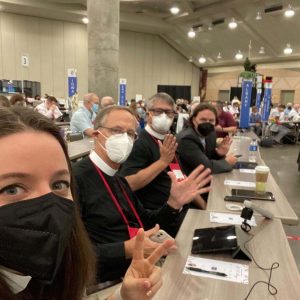 One of the recurring themes at this 80th General Convention has been racial justice and equity. The Episcopal Church has been on a journey in this regard for some time, having addressed matters of race consistently for decades. Much of this work has accelerated in recent years because of what has gone on in our nation, and the leadership of Presiding Bishop Michael Curry. While the General Convention has previously established educational offerings and encouraged the Beloved Community model as an aspiration for the Church, we have now committed to a time of study and introspection about our own specific history with race as a church. This includes evaluating the sources of Episcopal Church financial resources and beginning to allocate future funds to building up historically underrepresented peoples. We have also called for an honest evaluation of the Church’s role in facilitating indigenous boarding schools, where indigenous children were often abused. Understanding our history and the actions of previous generations is not about guilt, but about healing. If we do not know or admit the legacy of the Church’s historic actions we will continue to struggle to facilitate healing and reconciliation. Much of that history is recent enough that Deputies gave personal testimony on such matters. Before the 81st General Convention such investigations should give us a full sense of where we’ve been in the hopes that we can form a future that is defined by reconciling love.
One of the recurring themes at this 80th General Convention has been racial justice and equity. The Episcopal Church has been on a journey in this regard for some time, having addressed matters of race consistently for decades. Much of this work has accelerated in recent years because of what has gone on in our nation, and the leadership of Presiding Bishop Michael Curry. While the General Convention has previously established educational offerings and encouraged the Beloved Community model as an aspiration for the Church, we have now committed to a time of study and introspection about our own specific history with race as a church. This includes evaluating the sources of Episcopal Church financial resources and beginning to allocate future funds to building up historically underrepresented peoples. We have also called for an honest evaluation of the Church’s role in facilitating indigenous boarding schools, where indigenous children were often abused. Understanding our history and the actions of previous generations is not about guilt, but about healing. If we do not know or admit the legacy of the Church’s historic actions we will continue to struggle to facilitate healing and reconciliation. Much of that history is recent enough that Deputies gave personal testimony on such matters. Before the 81st General Convention such investigations should give us a full sense of where we’ve been in the hopes that we can form a future that is defined by reconciling love.
It is also important to note that the House of Deputies also embodied some of this work at this Convention by its historic election of a Latina lay woman, Julia Ayala Harris as it’s President, and an ordained indigenous female priest, Rachel Taber-Hamilton as its Vice President!
Pictured: The clergy of the deputation on the floor of the House of Deputies at General Convention.
The Election of Julia Ayala Harris as the President of the House of Deputies Submitted by the Rev. Kelly Steele
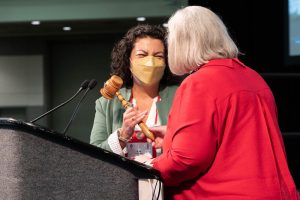 In Austin, at the 79th General Convention, Georgia’s Deputy the Rev. Cynthia Taylor was working with a group of lay and clergy women to bring forth reckoning and healing regarding gender-based abuse with the ultimately passed set of “#metoo” resolutions. Principle in the coordination of those successful efforts was Cynthia+ and others’ testimonies, which came forth through the collaborative organization of Executive Council member Julia Ayala Harris among a few others.
In Austin, at the 79th General Convention, Georgia’s Deputy the Rev. Cynthia Taylor was working with a group of lay and clergy women to bring forth reckoning and healing regarding gender-based abuse with the ultimately passed set of “#metoo” resolutions. Principle in the coordination of those successful efforts was Cynthia+ and others’ testimonies, which came forth through the collaborative organization of Executive Council member Julia Ayala Harris among a few others.
Back in 2018 in Austin, after the #metoo resolutions were sent along, I heard then-Deputy Ayala Harris talk excitedly late into the night about the ways to pull the levers of our governance to “do the right thing” for those wronged, and not only for the church’s #metoo movement. She was determined to help usher the church into better alignment with discipleship of Jesus while elevating those historically left behind, all while making our governance more adaptive to our present and future needs. As an obviously perceptive, collaborative, and generous person, I trusted Julia to do just that on Executive Council. As a former fellow Executive Council member seeing her work and promise, Bishop Logue convinced her to stand for election.
Even after years of hard work in the trenches with the highest form of church governance, she is someone who reads the Constitution & Canons of our church “for fun”. It was clear then and now: Julia was and is a workhorse for Jesus and a true force for inclusive and adaptive church leadership. I have the highest trust in her tenure, which will be like putting “new wine into new wineskins” (Luke 5:33-39).
Ayala Harris won by 37 votes above Ryan Kusumoto, also lay, with the three clergy candidates trailing them by 300 votes, signaling a desire to elevate lay leadership in the typical alternating pattern. Additionally, the House of Deputies elected The Reverend Rachel Taber-Hamilton as Vice President of the House of Deputies, the first Indigenous woman and first ordained woman in that role. Both President Ayala Harris and Vice President Taber-Hamilton will began their tenures at the final gavel on July 11, 2022. I am confident about their ability to handle the challenges and gifts of the coming biennium as our officer of the House of Deputies.
Photo by Deputy News/Scott Gunn: Julia Ayla Harris receives the gavel from former President of the House of Deputies, the Rev. Gay Clark Jennings, at the end of General Convention.
Creation Care and Immigration
Submitted by the Rev. Leeann Culbreath
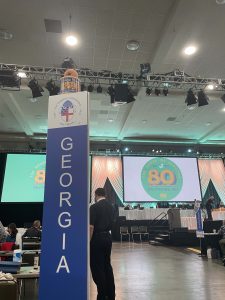 While the entire experience of my first General Convention was illuminating and inspiring, I was especially excited about legislation that advanced two of my own areas of ministry, immigration and Creation Care.
While the entire experience of my first General Convention was illuminating and inspiring, I was especially excited about legislation that advanced two of my own areas of ministry, immigration and Creation Care.
Immigration
A courtesy resolution (A167) commending the work of Episcopal Migration Ministries named staff and volunteers who have led their work with refugees, immigrants, and asylum seekers in the past several years. I was honored to be personally named in the resolution, recognizing my work as a co-founder and co-facilitator of EMM’s Asylum and Detention Ministry Network. Members of that network developed a resolution (D031) to oppose detention and surveillance of immigrants and asylum seekers, which passed both houses. This resolution establishes a clear position for the church on this issue, thus enabling the church to advocate for and develop humane alternatives to these abusive and exploitative practices.
Creation Care
Numerous resolutions addressing the care of God’s Creation set clear goals for the church’s ministry of healing and justice for the non-human world and for humans harmed by environmental degradation. Resolution A087 commits the church to “a goal of net carbon neutrality in its operations and the work of staff, standing commissions, interim bodies, and General Convention by 2030, through a combination of reducing emissions from travel, reducing energy use, increasing energy efficiency in buildings, and purchasing offsets from duly investigated, responsible, and ethical partners” and “encourage parishes, dioceses, schools, camps, and other Episcopal institutions to pursue their own goal of net carbon neutrality by 2030 through a combination of reducing emissions from travel, reducing energy use, increasing energy efficiency in buildings, and purchasing offsets from duly investigated, responsible, and ethical partners; and be it further.”
Resolution A088, “Commit to the Pressing Work of Addressing Global Climate Change and Environmental Justice,” recommits the church to the work and policies affirmed in previous conventions and encourages church advocacy ministries to advocate for policies and legislation that mitigate climate change, especially among marginalized, Indigenous, and frontline communities. Details on all Creation-centered resolutions can be found here: https://www.episcopalnewsservice.org/2022/07/11/general-convention-affirms-series-of-environment-creation-care-measures/
Pictured: The Diocese of Georgia marker with a peach and Georgia peanuts on top on the floor of the House of Deputies.
Indigenous People and the Episcopal Church
Submitted by Molly Stevenson
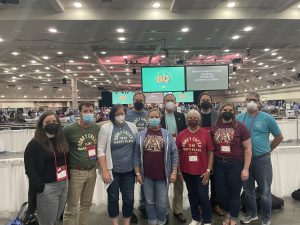 There were two particularly important pieces of legislation involving our Indigenous brothers and sisters that passed at the 80th General Convention. On the first legislative day, the House of Deputies heard testimony from some of our indigenous sisters who had been personally affected or whose family members were affected by their experiences in Episcopal boarding schools. The testimony was heartfelt and impassioned, and sometimes difficult to hear. To hear about incidents of abuse that happened to indigenous students “on our watch” was disturbing and eye opening. It was important for all of us for these testimonies to be given. It is a step toward much of the focus of this convention – Truth Telling and Reparation. We must know our entire past to be able to have a stronger future.
There were two particularly important pieces of legislation involving our Indigenous brothers and sisters that passed at the 80th General Convention. On the first legislative day, the House of Deputies heard testimony from some of our indigenous sisters who had been personally affected or whose family members were affected by their experiences in Episcopal boarding schools. The testimony was heartfelt and impassioned, and sometimes difficult to hear. To hear about incidents of abuse that happened to indigenous students “on our watch” was disturbing and eye opening. It was important for all of us for these testimonies to be given. It is a step toward much of the focus of this convention – Truth Telling and Reparation. We must know our entire past to be able to have a stronger future.
The second piece of legislation of particular importance for our indigenous brothers and sisters was a resolution that was on the consent calendar on the final day of legislation, involving the churches in Navajoland. Generally, there is no discussion on individual resolutions that have been put on the consent calendars. However, during a “Point of Personal Privilege”, a young woman was given permission to stand to thank the House of Deputies for including and passing the resolution that called for the people of Navajoland to have a voice in and be part of the process when choosing a bishop to serve their people. The person speaking is an indigenous woman who is an Episcopal priest who heeded the call to serve her people in Navajoland, and whose father had been a bishop.
When we listen to the reasons and stories behind resolutions that are part of legislation, so much can be learned!
Pictured: The deputation on Camp Day with Honey Creek t-shirts in the House of Deputies.
LGBTQ+ Representation in the Episcopal Church
Submitted by the Rev. David Rose
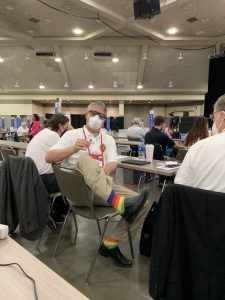 As a first-time deputy, it was a joy to attend and represent this diocese that has become home to my family and me. One of the truly refreshing aspects of General Convention was its inclusive nature. Inclusion wasn’t something simply given lip-service, but intentionally lived out in multiple aspects. From the ASL interpreter and captioning on every screen; worshiping in multiple languages; deputies who were in their teens to deputies who had been to 15 conventions; diversity among deputies including a high number of deputies of color, women, and deputies who are part of the LGBTQ+ community; one could not fail to notice the work that has been done to truly give voice to as broad a spectrum as possible.
As a first-time deputy, it was a joy to attend and represent this diocese that has become home to my family and me. One of the truly refreshing aspects of General Convention was its inclusive nature. Inclusion wasn’t something simply given lip-service, but intentionally lived out in multiple aspects. From the ASL interpreter and captioning on every screen; worshiping in multiple languages; deputies who were in their teens to deputies who had been to 15 conventions; diversity among deputies including a high number of deputies of color, women, and deputies who are part of the LGBTQ+ community; one could not fail to notice the work that has been done to truly give voice to as broad a spectrum as possible.
As the parent of a child who is part of the LGBTQ+ community, I was especially encouraged to be part of this convention with its more inclusive nature. Instead of arguing and endless debate focused only on creating winners and losers, what came forth was discussion on how best to engage in advocacy for, support, evangelism, and ministry to and with members of the LGBTQ+ community. Resolution A063 emerged as one tangible step forward emerging from this General Convention; the creation of a new staff person on the Presiding Bishop’s staff to focus on LGBTQ+ & Women’s ministries. A063 will focus on research and data collections, creation of resources, and forming networks to carry on this work. It is encouraging that as more and more of our parishes in the Diocese of Georgia begin to create space for increased ministry to and with our fellow LGBTQ+ parishioners and clergy colleagues, we don’t step out into this work alone, but with support from GC fellow Episcopalians around the world.
Pictured: The Rev. David rose with his rainbow socks.
From the sidelines to the field
Submitted by Liz Williams
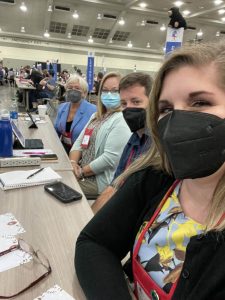 As the former Nominations Chair and Elections Czarina for the Diocese of Georgia, I’ve had the opportunity to facilitate the elections of our General Convention deputies the last few General Conventions. It was always an honor to send our deputation off to the infamous General Convention, and when I decided to run, it was with great respect and excitement. As a self proclaimed Church Nerd, arriving to the floor of convention was overwhelming. And getting to vote for the first time? Pure giddiness! Each session I grew more comfortable with the process and the flow of convention. We passed a lot of resolutions, had interesting conversations, and held elections. But more importantly, I came away with an even greater love for our church and the people in it. We continue to see where we have wronged others and how we can make amends, we continue to work towards proclaiming that the love of Christ is not exclusionary, and we look towards the future of the church. For all of this, and more, I am grateful to have been a member of our diocesan deputation.
As the former Nominations Chair and Elections Czarina for the Diocese of Georgia, I’ve had the opportunity to facilitate the elections of our General Convention deputies the last few General Conventions. It was always an honor to send our deputation off to the infamous General Convention, and when I decided to run, it was with great respect and excitement. As a self proclaimed Church Nerd, arriving to the floor of convention was overwhelming. And getting to vote for the first time? Pure giddiness! Each session I grew more comfortable with the process and the flow of convention. We passed a lot of resolutions, had interesting conversations, and held elections. But more importantly, I came away with an even greater love for our church and the people in it. We continue to see where we have wronged others and how we can make amends, we continue to work towards proclaiming that the love of Christ is not exclusionary, and we look towards the future of the church. For all of this, and more, I am grateful to have been a member of our diocesan deputation.
Pictured: The lay deputies on the floor of the House of Deputies.
A General Convention like none other
Submitted by Jody Grant
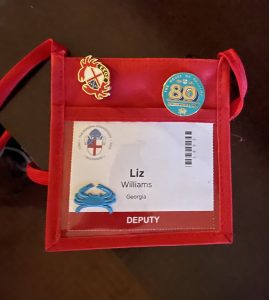 After a one year delay due to the pandemic, we returned to General Convention masked, vaccinated and ready to do the work of the Church. As Chair of Credentials, I had the unique opportunity to oversee the “checking in” of all deputies to ensure voice and vote of the dioceses. At last count, 802 deputies (clergy and lay) representing 107 dioceses were seated. My committee worked long hours on registration day, and then every day of sessions, as deputies checked in and alternates and deputies switched in and out. With shortened time frame and increased Covid restrictions, I knew this Convention would be different, and it was. Having been a deputy before, I missed the expanded worship services, the fellowship gatherings, the exhibit hall, and the in-person legislative hearings (and the snacks at the tables!). We still gathered together to accomplish the necessary tasks required by our constitution and canons. In spite of the differences between this Convention and others, great work, positive changes, and history-making elections were the result.
After a one year delay due to the pandemic, we returned to General Convention masked, vaccinated and ready to do the work of the Church. As Chair of Credentials, I had the unique opportunity to oversee the “checking in” of all deputies to ensure voice and vote of the dioceses. At last count, 802 deputies (clergy and lay) representing 107 dioceses were seated. My committee worked long hours on registration day, and then every day of sessions, as deputies checked in and alternates and deputies switched in and out. With shortened time frame and increased Covid restrictions, I knew this Convention would be different, and it was. Having been a deputy before, I missed the expanded worship services, the fellowship gatherings, the exhibit hall, and the in-person legislative hearings (and the snacks at the tables!). We still gathered together to accomplish the necessary tasks required by our constitution and canons. In spite of the differences between this Convention and others, great work, positive changes, and history-making elections were the result.
Pictured: The credentials for Liz Williams that designated her as a deputy and gave access to the convention center and the floor of the House of Deputies.
To view all of the resolutions that were part of this year’s General Convention, you can find them in the virtual binder here.
For a bird’s eye view of the convention, read this article by Episcopal News Service.
